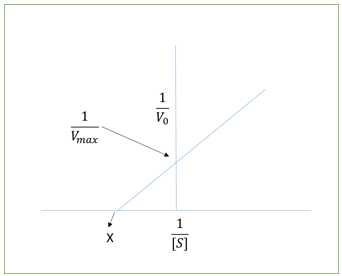Question

a.
Vₘₐₓ
b.
Kₘ/Vₘₐₓ
c.
–1/Kₘ
d.
Sₘₐₓ
Posted under Enzyme Technology
Interact with the Community - Share Your Thoughts
Uncertain About the Answer? Seek Clarification Here.
Understand the Explanation? Include it Here.
Q. In the following plot, what does X represent?
Similar Questions
Explore Relevant Multiple Choice Questions (MCQs)
Q. What does the following graph represent?
View solution
Q. What does the following plot represent?
View solution
Q. Which is the model proposed in the following diagram?
View solution
Q. An enzyme with a Kₘ of 5mM has a reaction rate of 100 mmol/min at substrate concentration of 0.25 mmol. What is the maximum reaction rate that this enzyme can achieve when its saturated with substrate?
View solution
Q. Given an enzyme with Kₘ of 0.25mM, at what substrate concentration will the velocity of the enzyme reach 1/2 of the Vₘₐₓ? (Vₘₐₓ = 100 mmol/s)
View solution
Q. A low Kₘ value points out a low affinity of an enzyme towards its substrate.
View solution
Q. ______________ is defined as an enzyme molecule’s efficiency to convert maximum substrate molecules into product per unit time.
View solution
Q. The equation which is based on reciprocal form of Miachelis Menten equation at constant [Et] level is referred to as ______________
View solution
Q. Which of the following equation is Eadie-Hofstee plot equation?
View solution
Q. Which of the following is termed as catalytic efficiency?
View solution
Q. What does the equation \(V_0=\frac{V_{max} [S]}{K_m+[S]}\) represent?
View solution
Q. What is the ratio of V₀/Vₘₐₓ when [S] = 10Kₘ?
View solution
Q. 4*10⁷: Catalase :: 25: ___________
View solution
Q. ___________ is defined as the enzyme’s binding efficiency with its appropriate substrate through optimized multiple non-covalent interactions.
View solution
Q. Miachelis Menten model is also referred to as “rapid equilibrium model”.
View solution
Q. Which of the following is based on rearrangement of Lineweaver Burk plot equation by multiplication of [S₀] factor?
View solution
Q. What does the following equation represent?
\(\frac{1}{V_0} = \frac{K_m}{V_{max}} \frac{1}{[S]}+\frac{1}{V_{max}}\)
View solution
Q. Which of these is referred to as Kcat?
View solution
Q. Which of the following assumption was not made in rapid equilibrium model?
View solution
Q. Which of these is not required for electrophilic catalysis?
View solution
Recommended Subjects
Are you eager to expand your knowledge beyond Enzyme Technology? We've handpicked a range of related categories that you might find intriguing.
Click on the categories below to discover a wealth of MCQs and enrich your understanding of various subjects. Happy exploring!








